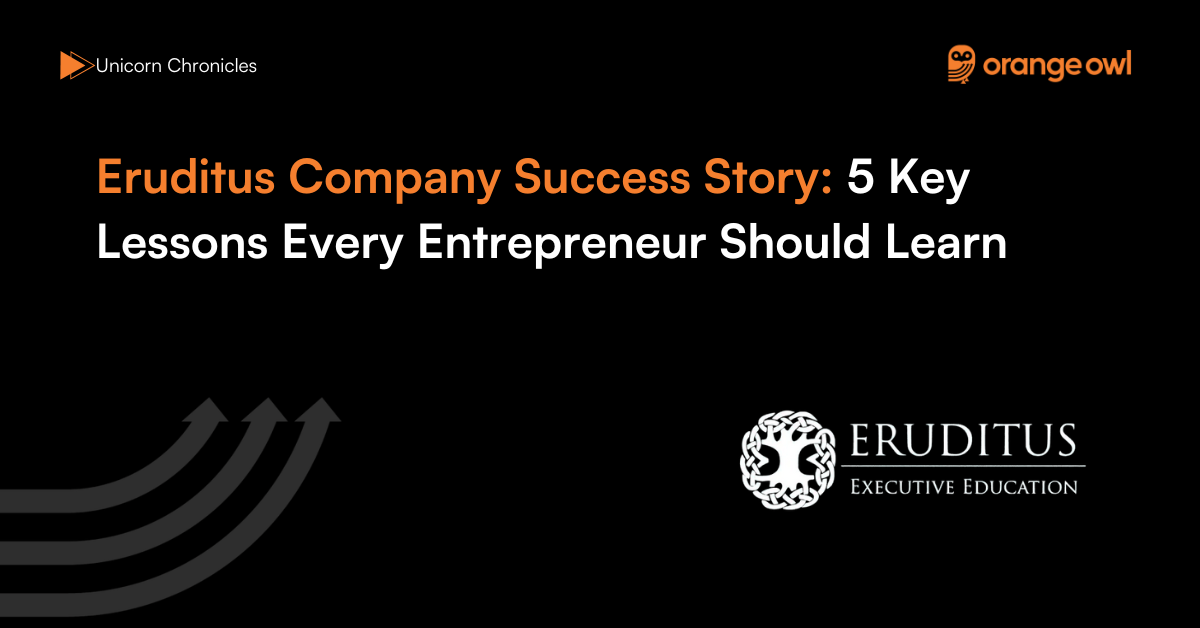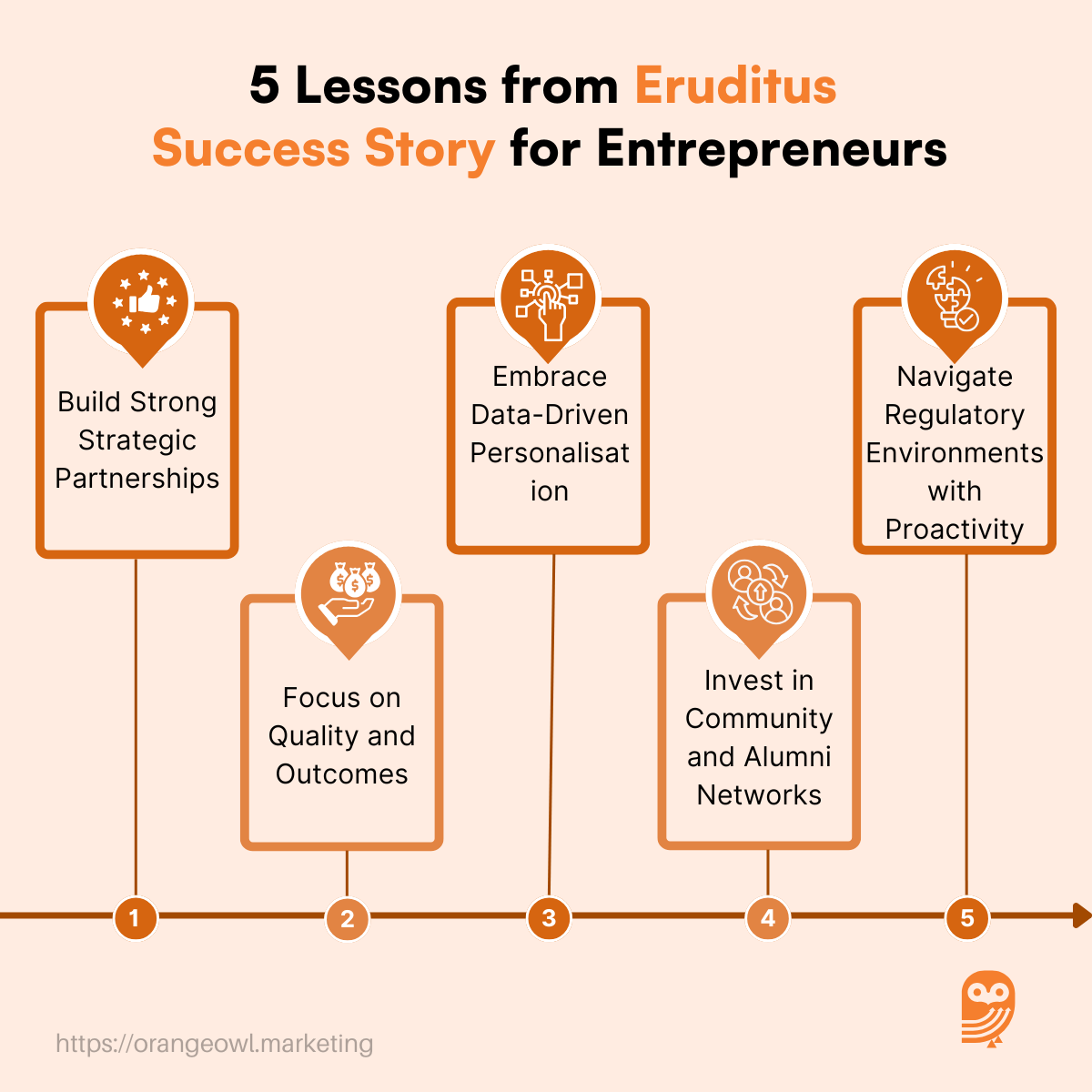Eruditus Success Story: 5 Key Lessons for Every Entrepreneur
Vivek Goel
June 17, 2025

Table of Contents
Introduction
In 2010, Ashwin Venkata Damera and Chaitanya Kalipatnapu set out to challenge one of the most exclusive and inaccessible spaces in education: executive learning. The result was Eruditus, a Singapore-headquartered edtech startup that would go on to redefine how professionals access world-class education. Their vision was simple yet powerful—to make Ivy League and global university programs accessible to learners everywhere, without the traditional barriers of cost, location, or time away from work.
Ashwin, a Harvard Business School alumnus, knew firsthand the limitations faced by working professionals in emerging markets. With Eruditus, the goal was not just to digitise education, but to democratise it by partnering directly with top-tier institutions like MIT, Wharton, INSEAD, and Columbia to deliver rigorous, affordable, and career-relevant courses online. These weren’t just video lectures—they were immersive, cohort-based programs designed to retain the academic excellence of campus learning.
Through its consumer-facing brand, Emeritus, Eruditus quickly scaled across 80+ countries, reaching over 300,000 learners. The company’s unique model—built on deep university partnerships, localised pricing, and high completion rates—helped it thrive in a competitive edtech space. By 2024, the Eruditus success story had become a global benchmark, with $961 million in funding, a $3.1 billion valuation, and programs that empowered a new generation of lifelong learners.
In a world where credentials often trump competence and access remains unequal, Eruditus proved that with the right mission, academic integrity, and scalable technology, you can make elite education truly inclusive—and build a unicorn while doing it.
Origin Story
The seeds of Eruditus were planted during Ashwin Venkata Damera’s transformative experience at Harvard Business School. While the education was world-class, Ashwin couldn’t ignore a simple truth: the vast majority of working professionals, especially in emerging markets, would never have access to such elite programs due to high costs, geographic constraints, and time commitments. This realisation became the foundation for something far more ambitious.
Along with co-founder Chaitanya Kalipatnapu, Ashwin envisioned a bold new model: bring Ivy League-quality education to professionals around the world without requiring them to quit their jobs or relocate.
Rather than replicating traditional university classrooms online, they wanted to reimagine the entire learning experience, offering rigorous, cohort-based programs that combined the prestige of top institutions with the flexibility and accessibility of digital learning.
In the early days, Eruditus operated as a facilitator, working closely with universities to design and deliver in-person executive programs in international markets like India, Latin America, and the Middle East. But even then, the founders knew that physical formats would only take them so far.
The real breakthrough came when they launched Emeritus, Eruditus’s digital learning arm, which enabled global learners to access high-quality university programs online, often at a fraction of the cost.
This hybrid approach—rooted in academic partnerships, deep learner insights, and scalable tech infrastructure—quickly set Eruditus apart. Programs were not only co-created with institutions like MIT, Wharton, and INSEAD, but also localised and priced appropriately for each region. As Ashwin later recalled:
“We weren’t just exporting education—we were making it relevant, accessible, and transformational for professionals across the globe.”
Eruditus wasn’t trying to patch the holes in the traditional system. It was building a new model altogether—a global classroom without borders, where quality, not geography, determined access.
Business Landscape and Challenges
When Eruditus entered the executive education space in 2010, the global learning landscape was heavily skewed toward elite, on-campus programs offered by top business schools. Access to such programs was a privilege reserved for a small, affluent, and geographically concentrated audience, mostly senior executives in the West.
The rest of the world, especially professionals from India, Latin America, Southeast Asia, and the Middle East, were largely left out of the upskilling revolution. The traditional model was expensive, inflexible, and exclusionary.
Despite growing demand for leadership and management training, the world’s best academic content remained locked behind physical campuses and six-figure tuition fees. There was a gaping need for a new kind of learning experience—one that preserved the rigour of global universities while making it accessible, affordable, and relevant for working professionals across borders.
Eruditus’s entry into this domain posed fundamental challenges: convincing top-tier universities to digitise their executive programs and partner with an external edtech company was no small feat, as academia had long resisted digital delivery, fearing it would dilute the brand and learning outcomes.
Even if world-class content could be brought online, there was the challenge of ensuring it resonated with mid-career professionals from vastly different geographies, industries, and educational backgrounds. Additionally, for professionals investing thousands of dollars into their education, credibility mattered. As a relatively unknown player, Eruditus had to prove that its programs could match the learning value and prestige of traditional formats.
To navigate these challenges, Eruditus adopted a partnership-first approach. Rather than building generic courses, it co-created customised, high-touch programs with institutions like MIT Sloan, Wharton, and INSEAD—tailored to global learners and delivered via Emeritus, its digital learning platform. The company focused on creating cohort-based experiences with live faculty sessions, assignments, and peer interaction—elements that preserved academic rigour even in a virtual setting.
At the same time, Eruditus localised pricing and offered no-cost EMI options to drive affordability in emerging markets, helping democratize access to executive education and enabling thousands of professionals from over 80 countries to participate in programs they would have never imagined possible.
As Ashwin Damera reflected in an interview:
“We weren’t trying to replace universities—we were trying to amplify their impact. By using tech and empathy, we brought global classrooms to doorsteps.”
In doing so, Eruditus not only redefined executive education for the digital age—it rewired the way institutions thought about scale, access, and inclusion.
Growth Strategies
Eruditus’s remarkable growth story is built on a combination of strategic partnerships, technological innovation, and a relentless focus on learner outcomes. At the core, Eruditus adopted a partnership-led model, collaborating with world-renowned universities like MIT Sloan, Wharton, INSEAD, and Columbia to co-create executive-level programs tailored for global working professionals.
This approach allowed Eruditus to leverage the credibility and academic rigour of top institutions while expanding its reach beyond traditional campus boundaries.
A key driver of growth was Eruditus’s digital-first delivery platform, which combined live interactive sessions, cohort-based learning, and personalised support to replicate the engagement and networking benefits of in-person programs online.
This hybrid model made high-quality executive education accessible, flexible, and scalable, particularly for professionals in emerging markets who previously faced barriers due to cost, location, or time constraints.
Eruditus also differentiated itself by focusing on localisation and affordability, offering programs at competitive price points with flexible payment options such as EMIs and scholarships. This helped tap into a massive, underserved demand across India, Latin America, the Middle East, and Southeast Asia.
To further drive adoption, Eruditus invested heavily in data analytics and learner insights to continuously refine course offerings, enhance engagement, and improve completion rates.
By prioritising quality, accessibility, and global reach, Eruditus not only scaled rapidly, raising nearly $1 billion in funding and achieving a $3.1 billion valuation, but also redefined the future of executive education for the digital age.
Marketing Strategy
Unlike many edtech companies that rely heavily on mass advertising, Eruditus adopted a more targeted and relationship-driven marketing strategy. Central to Eruditus’s approach was a focus on building credibility and trust by leveraging its partnerships with top global universities.
As co-founder Ashwin Venkata Damera puts it, “Our university partnerships are not just a logo on a webpage—they are the foundation of our promise to deliver high-quality, credible education.”
This association provided an inherent brand authority that was highlighted through thought leadership content, webinars, and expert-led sessions. Eruditus invested significantly in content marketing, producing rich, informative resources such as whitepapers, case studies, and success stories that demonstrated the real-world impact of its executive education programs.
Ashwin explains, “We believe education should inspire and inform before it sells. Content is how we build that bridge with our learners.”
These materials were distributed through digital channels and professional networks, helping to educate and engage prospective learners about the value of continued education.
The company also leveraged highly personalised outreach to corporates and individual professionals, combining data-driven insights with cohort-based promotions to target working professionals seeking career advancement. This approach ensured that marketing efforts were contextual, relevant, and timed to the needs of busy executives.
In addition, Eruditus placed strong emphasis on alumni networks and word-of-mouth referrals, recognising that trust in the professional education space is often built through peer recommendations and proven outcomes.
As Ashwin notes, “Our alumni are our best ambassadors. Their success stories fuel our growth and credibility.”
By fostering a community of successful learners and showcasing their career growth, Eruditus created a virtuous cycle of credibility and enrollment.
Through this blend of university partnerships, content-led education, personalised engagement, and alumni advocacy, Eruditus cultivated a powerful brand presence in the global executive education market, driving sustained growth without resorting to broad-based mass marketing.
5 Key Lessons for Every Entrepreneur
1. Build Strong Strategic Partnerships
Eruditus’s success story underscores the power of collaborating with top-tier global universities. Instead of trying to build everything in-house, Eruditus strategically partnered with renowned academic institutions, leveraging their brand value and academic rigour to create highly credible executive programs.
This approach helped Eruditus quickly gain market trust and scale across geographies. For entrepreneurs, this highlights how partnering with established, trusted players can accelerate growth and open doors that might otherwise be inaccessible.
2. Focus on Quality and Outcomes
In the education sector, quality matters more than quantity. Eruditus prioritised delivering programs that not only educated but also created a measurable career impact for professionals.
This strong focus on outcomes resulted in high course completion rates and positive student testimonials that fueled organic growth. Entrepreneurs should take note that building products or services that tangibly improve customers’ lives will drive loyalty, advocacy, and long-term success, far beyond initial acquisition.

3. Embrace Data-Driven Personalisation
Eruditus harnesses the power of data analytics to tailor learning journeys according to individual professional needs and preferences. By analysing user behaviour and feedback, they optimise course recommendations and engagement strategies, ensuring learners stay motivated and achieve their goals.
This level of personalisation fosters deeper customer satisfaction and repeat usage. Entrepreneurs can learn that leveraging data to personalise experiences not only improves engagement but also differentiates their offering in crowded markets.
4. Invest in Community and Alumni Networks
Eruditus recognises the importance of building a strong community of engaged learners and alumni who serve as brand ambassadors and referral sources. This ongoing connection helps maintain relevance long after program completion, driving repeat enrollments and enhancing reputation.
Entrepreneurs should understand that cultivating a loyal community creates a powerful network effect, where satisfied customers become advocates who contribute to sustained growth and brand strength.
5. Navigate Regulatory Environments with Proactivity
Education often involves navigating complex regulatory frameworks, accreditation standards, and cross-border compliance. Eruditus’s success was aided by its proactive engagement with regulatory authorities and adherence to global quality benchmarks, allowing seamless expansion across regions.
For entrepreneurs, this demonstrates that viewing regulation as a strategic partner rather than an obstacle can build trust, ensure sustainability, and reduce operational risks in the long run.
Conclusion
BYJU’S journey from a humble startup to becoming India’s largest edtech unicorn exemplifies the transformative power of technology, vision, and relentless focus on the learner.
At a time when education was often confined to traditional classrooms and uneven access, BYJU’S revolutionised how millions of students engage with learning, making it interactive, personalised, and accessible anytime, anywhere. More than just an edtech platform, BYJU’S became a global education movement, inspiring innovation across the sector.
For entrepreneurs, the BYJU’S success story offers invaluable lessons: from putting the student at the heart of every decision to building a strong brand with authentic partnerships like the one with Shah Rukh Khan, and from harnessing cutting-edge technology to scaling with agility and purpose. As Byju Raveendran aptly puts it,
“Our mission is to transform education by making learning joyful, engaging, and accessible for every child, no matter where they are.”
This vision, backed by execution excellence, is what truly propelled BYJU’S to the forefront of global education.


